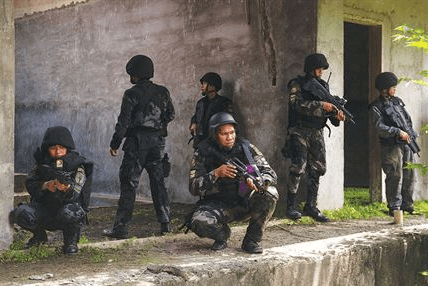
During OEF-P or Operation Enduring Freedom – Philippines Special Forces teams from the 1st Special Forces Group and 19th Special Forces Group had a long-term commitment in the Philippines in a ‘train, advise, and assist’ mission. The Special Operations Command Pacific (SOCPAC) based in Hawaii had assisted in the deployment of a Joint Special Operations Task Force (JSOTF) to provide the C2, staff, and support necessary for the SF operational detachments to perform the advisory and training mission.
Linda Robinson, a Senior International Policy Analyst at RAND Corporation, has published numerous works on special operations forces. In an article in PRISM she writes about the “. . . partnered, light footprint approach . . .” used in the Philippines that has met with success. The 14-year long endeavor saw U.S. SOF as a primary outside force supporting a partner nation’s security forces that were the leading actors in a long-term counterinsurgency and counterterrorism campaign.
OEF-P was formed to assist the Philippine security forces in combating the insurgent and terrorist groups in the southern region of Mindanao. The initial phase saw almost 1,300 U.S. forces deployed but that number was reduced in time to around 500-600 personnel. The operation was first conceived in the fall of 2001 shortly after the terrorist attacks of 9/11 when a SOF assessment team visited the Philippines. In 2002 Joint Task Force 510 – a SOF task force – was established to provide training, advice, and assistance to the Philippine security forces in civil-military operations, information operations, and security. In time, a Joint Special Operations Task Force or JSOTF was formed for the mission.
The task force was comprised of Special Forces, Civil Affairs, and Military Information Support Operations (MISO) personnel. Members of the Air Force Special Operations Command (AFSOC) and Navy SEALs participated in the training mission as well. U.S. SOF also provided tactical battlefield advice, intelligence support (ISR), and casualty evacuation.
JSOTF-P officially ended its operations in early 2015. The 14-year commitment by U.S. SOF to professionalize the Philippine security forces and degrade the terrorist networks and groups operating in the Philippines is considered a big success. Currently, SOF interaction with the Philippine security forces consists of contacts through the U.S. Embassy in Manila as well as periodic training exercises by U.S. special operations forces and conventional forces (although the current political environment seems problematic).
Read the entire article by Linda Robinson in “The SOF Experience in the Philippines and the Implications for Future Defense Strategy”, PRISM, Volume 6, No 3, December 7, 2016.
Photo credit: SSG Christopher Hubenthal.